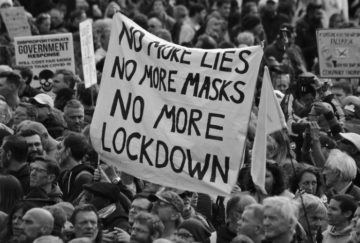William Callison and Quinn Slobodian in the Boston Review:
 Over the past year, mobilizations around the world have sprung up against governmental efforts to contain the coronavirus through lockdowns, social distancing guidelines, mask mandates, and vaccines. Led in many cases by angry freelancers and the self-employed, amplified by entrepreneurs of speculative and totalizing prophecies, these movements are less what José Ortega y Gasset called “the revolt of the masses” and more “the revolt of the Mittelstand”—small- and medium-sized businesses. In comparison to the populism that dominated discussion in 2017, they are less tethered to mediagenic leaders and parties, slipperier on the traditional political spectrum, and less fixated on the assumption of state power. The spectacular and deadly storming of the U.S. Capitol on January 6 has understandably eclipsed all other mobilizations for the moment. Yet, by drawing back the lens, we can see where aspects of a narrowly defined Trumpism overlap with a broader global phenomenon—and where they do not.
Over the past year, mobilizations around the world have sprung up against governmental efforts to contain the coronavirus through lockdowns, social distancing guidelines, mask mandates, and vaccines. Led in many cases by angry freelancers and the self-employed, amplified by entrepreneurs of speculative and totalizing prophecies, these movements are less what José Ortega y Gasset called “the revolt of the masses” and more “the revolt of the Mittelstand”—small- and medium-sized businesses. In comparison to the populism that dominated discussion in 2017, they are less tethered to mediagenic leaders and parties, slipperier on the traditional political spectrum, and less fixated on the assumption of state power. The spectacular and deadly storming of the U.S. Capitol on January 6 has understandably eclipsed all other mobilizations for the moment. Yet, by drawing back the lens, we can see where aspects of a narrowly defined Trumpism overlap with a broader global phenomenon—and where they do not.
More here.
